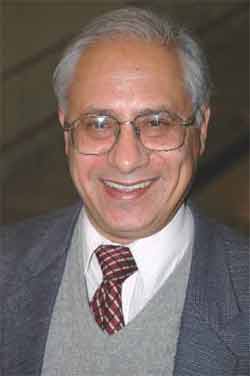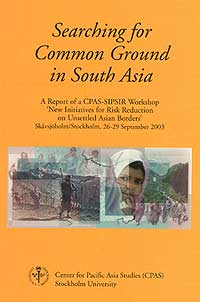SWEDISH SOUTH ASIAN STUDIES NETWORK
Center for Pacific Asia Studies (CPAS), Stockholm University:
On 1 January 2010, Stockholm University closed down its Center for Pacific Asia Studies (CPAS). ![]()
It was first established in 1976 as a Centre for Japanese Studies, but changed name and became Centrum för stillahavsasienstudier (CPAS) from 1984. In spite of its main focus on East and South-East Asia, CPAS has over the years also been involved in research related to India, Pakistan, Sri Lanka and other parts of South Asia as well, especially during a period when Dr. Ravinder
Pal Singh worked as a Senior Fellow at CPAS.
Besides research, one of its chief aims has also been to reach beyond the university
in order to bring scholars and students into contact with other groups
with an active, professional interest in the Pacific Asian region. CPAS has regularly organised Wednesday lectures, seminars and workshops on important issues, including a high-profile 2003 workshop on India-Pakistan
tensions (more information).
CPAS has been an autonomous research unit under the Dept. of
Oriental Languages, located at Kräftriket, House 4 B (previously
Roslagsvägen 101), but now its staff (including the last Director, Prof. Masako
Ikegami) has been transferred to the Dept. of Political Science.
The budget for Asian research activities
has also been transferred, which gives the former CPAS researchers a possibility to carry out
strictly social scientific research on Asia
together with other departments within the faculty of Social
Sciences, Stockholm University (facilitated by an academic board
for inter-disciplinary research among the
departments). Hopefully, after some time the
activities that CPAS used to conduct, such as
seminars, workshops and publications, will also be restored within the new framework.

Research connected to South Asia:
From 2003 till April 2005 Ravinder
Pal Singh worked as a Senior Fellow at CPAS.
In the 1990’s he was also for seven years (1993–200) based
in Stockholm as Project Leader at SIPRI
(Stockholm International Peace Research Institute. After that he was a
Senior Fellow at the Geneva Centre for Democratic
Control of the Armed Forces in 2001, and the following year he served
as UNDP Mission Leader for Security Sector Reforms in former Yugoslavia.
Ravinder Pal Singh is engaged in research on the security
situation in South Asia, and relations between India and Pakistan. In
1998, while at SIPRI, he edited a volume for Oxford University Press on
”Arms Procurement Decision Making, Volume 1: China, India, Israel,
Japan, South Korea and Thailand”. More
information on the book.
In November 2002 he took part in the Pugwash Workshop on South Asian Security
at Geneva, Switzerland, where he presented a paper on ”Some
Cooperative Initiatives for India-Pakistan Dialogue and Risk Reduction”.
Contacts he made at the Pugwash conference became important in arranging
for a CPAS Workshop on ”New Initiatives for
Risk Reduction on Unsettled Asian Borders” held in September
2003 (with a follow-up seminar a year later). More information below.
In August 2003 Ravinder Pal Singh was awarded 40 000 SEK
as a SASNET planning grant for a research project on ”Security
Sector Governance in Southern Asia: a case study of Indian Parliamentary
Oversight of Security Sector.” See
the full list of planning grants distributed in August 2003.
Abstract of project: The project aims to study application
of democratic governance principles in conduct of parliamentary oversight
of the security sector in India in respect of the following elements:
a) aligning defence policies and expenditure with society’s broader
priorities; b) professional accountability and validation of security
sector decision making processes; c) monitoring, scrutinizing and reviewing
consistency and coherence in defence policies with other instruments of
national security; d) providing a wider perspective of civil society and
security sector concerns. Developing compliance with human rights and
humanitarian law; and e) Understanding gender perspective in armed forces
for ensuring women’s rights and justice.
In April 2005 Ravinder Pal Singh returned to India after completing his fellowship at CPAS. He has previously been connected to the Institute for Defence Studies and Analyses in New Delhi, where he also has been working as a Senior Fellow.
CPAS Workshop on ”New Initiatives for Risk Reduction on Unsettled Asian Borders”
![]() In
collaboration with SIPSIR (Swedish Initiative for Peace, Security and
International Relations), CPAS organised a three-day workshop on India-Pakistan
tensions in Skåvsjöholm/Stockholm, 26-29 September 2003, convened
by Ravinder Pal Singh. The workshop, partly funded by the Swedish authorities,
was titled ”New Initiatives for Risk Reduction
on Unsettled Asian Borders”. The participants consisted
of a small group of distinguished experts from India, Pakistan, and other
regions, all with such diverse backgrounds as military and strategic experience,
diplomacy, confidence building measures, human rights and democracy, and
nuclear nonproliferation (Some of the participants on the photo of
to the right).
In
collaboration with SIPSIR (Swedish Initiative for Peace, Security and
International Relations), CPAS organised a three-day workshop on India-Pakistan
tensions in Skåvsjöholm/Stockholm, 26-29 September 2003, convened
by Ravinder Pal Singh. The workshop, partly funded by the Swedish authorities,
was titled ”New Initiatives for Risk Reduction
on Unsettled Asian Borders”. The participants consisted
of a small group of distinguished experts from India, Pakistan, and other
regions, all with such diverse backgrounds as military and strategic experience,
diplomacy, confidence building measures, human rights and democracy, and
nuclear nonproliferation (Some of the participants on the photo of
to the right).
They included high-profile personalities such as Lt Gen Moti
Dar (former Vice-Chief of the Indian Army Staff, and involved
in Indo-Pakistan Track II diplomacy), Mr Salman
Haidar
(former Indian Foreign Secretary, Ambassador to China, and High commissioner
to UK), Gen Jehangir Karamat (former Chairman
Joint Chiefs of Staff and Chief of Army Staff of Pakistan), Lt Gen Talat
Masood (former Pakistani Secretary of Defence Production),
and Ms Zohra Yusuf (Council Member of
the independent, non-governmental Human Rights Commission of Pakistan).
Besides these a number of scholars also took part in the workshop,
among them Dr Ishtiaq
Ahmed from the Dept. of Political Science,
Stockholm University; Mr. Wajahat Habibullah,
former Director of Lal Bahadur Shastri National Academy of Administration,
New Delhi; and Dr Pervez Hoodbhoy, Professor
of Physics at Quaid-e-AzamUniversity, Islamabad.
 The
report of the workshop was printed and published as a book in January
2004. The book was titled ”Searching for Common
Ground in South Asia” and was edited by Ravinder Pal Singh
(with assistance from Roberto Menkes and
Mirja Juntunen from the Division
of Indology, Department of Oriental Languages, Stockholm University).
It was later also published in extenso on the Internet, as a pdf-file.
The
report of the workshop was printed and published as a book in January
2004. The book was titled ”Searching for Common
Ground in South Asia” and was edited by Ravinder Pal Singh
(with assistance from Roberto Menkes and
Mirja Juntunen from the Division
of Indology, Department of Oriental Languages, Stockholm University).
It was later also published in extenso on the Internet, as a pdf-file.
The unique combination of experts at the workshop created
a sound and trusting work atmosphere, which resulted in very open, lively
and sincere discussions. As a result of the workshop it was even possible
to arrive at some common understanding on issues such as preventive diplomacy
and confidence-building initiatives for risk reduction and
conflict prevention measures, security sector governance and application
of International Humanitarian Law, and military/technical options for
Lines of Control Surveillance for risk reduction and conflict prevention.
From among the ideas offered by experts at the workshop, some commonly
shared recommendations were identified for their potential to advance
the Indo-Pakistan stability dialogue in a meaningful way. A Contact Group
of experts from India and Pakistan agreed to take initiatives for risk
reduction. As a follow-up a new brainstorming workshop was therefore arranged
on Swedish ground, in Uppsala 1–4 June 2004, also convened by Ravinder
Pal Singh.
Five of papers presented at this workshop No 2 were published as part
of the CPAS Journal (The Stockholm Journal
of East Asian Studies), vol. 14 in April 2005.
The papers now published are:
• Lt Gen Talat Masood: Building the Architecture for Peace and Stability.
• Mr Wajahat Habibullah: The Problem of Kashmir and its Resolution
• Lt Gen Moti Dar: Designing a Framework for Military Risk Reduction
• Dr Ravinder Pal Singh: Peace Education to Advance the India-Pakistan
Dialogie
• Mr Shafquat Mahmood: India/Pakistan: Ways to Advance the Security
Dialogue and Democratic Governance of the Security Sector.
SASNET - Swedish South Asian Studies Network/Lund
University
Address: Scheelevägen 15 D, SE-223 70 Lund, Sweden
Phone: +46 46 222 73 40
Webmaster: Lars Eklund
Last updated
2010-02-03
